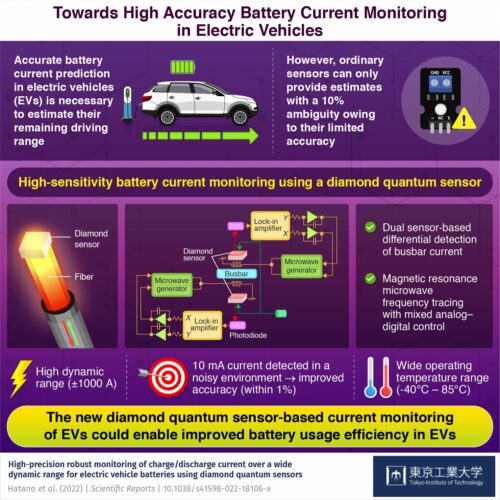A team of researchers from Japan, led by Professor Mutsuko Hatano from the Tokyo Institute of Technology (Tokyo Tech), has reported that a diamond quantum sensor assists in the precise estimation of the battery charge of electrical vehicles

Electrical Vehicles are necessary for the green revolution but, inaccurate estimation of battery charge leads to its low demand in the market. Since commercial sensors are unable to detect small changes in current at milliampere levels, this results in uncertainty of approximately 10% in the battery charge estimation. To overcome this problem, a team of researchers announced a technique that utilizes a diamond quantum sensor that can record battery charge estimation accuracy within 1% while measuring high currents that is normal in EVs.
“We developed diamond sensors that are sensitive to milliampere currents and compact enough to be implemented in automobiles. Furthermore, we measured currents in a wide range as well as detected milliampere-level currents in a noisy environment,” explains Prof. Hatano.
The research team configured a model using two diamond quantum sensors that were placed on either side of the busbar (electrical junction for incoming and outgoing currents) in the car. They implemented a “differential detection” technique to avoid the common noise detected by both the sensors and retain only the actual signal. This resulted in the detection of a small current of 10 mA amid background environmental noise. This prototype was tested for Worldwide Harmonized Light Vehicles Test Cycle (WLTC) driving, a standard test for energy consumption in EVs. They analyzed that the sensor accurately traced the current from -50 A to 130 A and displayed the battery charge estimation accuracy within 1%
Prof. Hatano says, “Increasing battery usage efficiency by 10% would reduce battery weight by 10%, which will reduce 3.5% running energy and 5% production energy of 20 million new EVs in 2030 WW. This, in turn, corresponds to a 0.2% reduction in CO2 emissions in 2030 WW transportation field.”
Click here for the Published Research Paper









